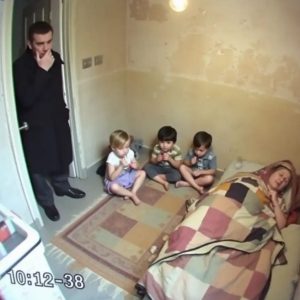The knock on the door was firm and precise, carrying with it an air of authority that immediately set my nerves on edge. When I opened it, I found a uniformed police officer standing there, his expression professional but tinged with curiosity, and beside him was Mrs.
Miller, my next-door neighbor, who had long taken it upon herself to act as the self-appointed guardian of every piece of gossip in the neighborhood.
She stood with her arms crossed, her eyes narrowed, as if daring me to explain the situation before either of them spoke. “Good afternoon, ma’am,” the officer said, his voice steady but carrying a subtle edge of concern.
“I’m here about a report concerning… your cat.” I blinked in disbelief. “Marsa?” I asked, barely able to comprehend what I was hearing. The officer nodded once, his gaze unwavering. “Yes. May we come in?”
A knot tightened in my stomach, a mixture of confusion and unease. I stepped aside and motioned for them to enter the living room, where Marsa — my tabby, a cat both fierce in temperament and affectionate in nature — was curled around a small, wriggling pile of puppies.
Their tiny squeaks and high-pitched cries filled the room, creating a cacophony that immediately drew Mrs. Miller’s attention. Her eyes widened, half in triumph at having anticipated trouble, half in disbelief at the sight before her.
“Marsa, right?” the officer asked, gesturing toward the corner where the tabby lay protectively over the puppies. “Yes,” I said quietly, my voice tinged with uncertainty. “That’s her. She’s been… busy lately.”
The officer exhaled slowly, his eyes scanning the improbable scene as if trying to reconcile the report with reality. “We’ve received multiple reports of missing puppies in the neighborhood over the past week,” he explained carefully.
“Several families have expressed concern, and our goal is simply to determine where these puppies have gone and ensure their safety.” My heart skipped a beat at the mention of missing puppies.
I glanced down at my daughter, Lili, who had instinctively tightened her grip around my hand, her small fingers pressing into mine with a mix of fear and curiosity.
Over the past week, I had noticed Marsa acting strangely — slipping out of the house at odd hours, returning exhausted and dirty, her belly occasionally matted with leaves or bits of grass.
I had assumed she was simply exploring, but never had I imagined that she was collecting and caring for a litter of abandoned puppies.
Before I could form a response, Mrs. Miller interjected sharply, her voice tinged with accusation. “I saw her dragging something across your yard two days ago,” she said. “At first, I thought it was a toy. But then… it barked.”
The room fell into stunned silence. I looked at Marsa, who blinked calmly up at us, her green eyes steady and untroubled, while the puppies nestled against her fur as if they had always been hers.
“They’re safe,” I said finally, my voice gaining a measure of confidence as I realized I was defending the truth. “She’s been feeding them, keeping them warm, making sure they’re okay.
I didn’t know where she found them — I just assumed she was… doing something important.” My words trailed off, aware of how absurd the explanation sounded even as I spoke it.
The officer’s expression softened slightly, his posture relaxing. “We’re not here to accuse anyone,” he assured me. “Honestly, your cat may simply have been trying to help.
But it’s our duty to determine where these puppies came from, because their owners deserve to know they’re safe.”
Lili crouched down beside Marsa, gently stroking her back, whispering, “She’s been such a good mommy. She brings them food and cleans them.”
The officer nodded, a faint smile tugging at the corners of his mouth. “Maternal instinct is a powerful thing,” he said, looking back at me. “Would you be willing to help us trace where she’s been going?”
I nodded immediately, understanding that there was no real choice — and truthfully, I was as curious as they were to discover Marsa’s secret mission.
That afternoon, the three of us — the officer, Mrs. Miller, and I — followed Marsa at a careful distance. She moved with the deliberate precision of a creature on a mission, tail held high, as she trotted down the alley behind our row of houses.
Every few feet, she glanced back to ensure we were keeping pace, before slipping through a narrow gap at the end of the block.
Beyond the gap lay an overgrown lot, forgotten by the town and hidden from casual view. Tall grasses swayed in the wind, blackberry bushes tangled over the edges of a small clearing, and an old oak tree bent low, its gnarled branches shading a patch of exposed earth.
Marsa moved silently through the underbrush, her small paws making barely a sound on the soft ground. We followed cautiously, careful not to startle her.
She stopped suddenly at the base of the oak tree, letting out a soft, insistent meow. Pushing aside the curtain of leaves, my breath caught.
Beneath the roots was a makeshift den — a shallow hollow lined with scraps of fabric, bits of straw, and old newspapers. Inside were more puppies, huddled together in a heap, their tiny bodies shivering slightly from cold.
The officer crouched down, speaking softly into his radio. “We’ve got them,” he said in a calm, professional tone. It became clear that an abandoned dog, a young mother, had given birth there weeks ago before disappearing entirely.
Marsa had discovered the litter, and recognizing that they were alone and in danger, she had begun transporting them back to our home, one by one.
She had adopted them as her own, feeding and keeping them warm, showing a level of care that was both astonishing and profoundly moving. Animal services arrived shortly after, and the officer explained everything to his colleagues as they carefully lifted each puppy into a blanket-lined carrier.
Mrs. Miller, who had been so quick to judge, looked sheepish as she muttered, “Guess your cat’s got more compassion than most of us.”
We stayed until the last puppy was safely secured. Marsa observed the process quietly, her tail flicking occasionally but her eyes calm and composed. I knelt beside her, pressing my hand against her head.
“You did good, sweetheart,” I whispered. “You saved them.” Back at home, Marsa wandered restlessly for a while, pacing near the door as if waiting for her new family to arrive.
When the officer returned later that evening to provide an update, he reported that the puppies were healthy — underweight, but thriving — and that animal services had located two of the owners, while the remaining pups were being cared for at the shelter until they could be adopted.
“They wouldn’t have survived without her,” he said, smiling warmly. Later, as Lili and I sat on the floor beside Marsa’s empty corner, my daughter’s small voice broke the silence. “Will she be sad now that they’re gone?” she asked softly.
“Maybe,” I replied. “But I think she knows she helped them. That’s what a good mother does — she acts when it matters most.
For a long time, we sat together in silence, listening to the steady rhythm of Marsa’s purr, a sound that was comforting, grounding, and strangely reassuring. It reminded us that compassion often comes in unexpected forms, quietly and without fanfare.
The following morning, Mrs. Miller appeared at the door again, holding a small cardboard box. Inside were a few toys and a bag of treats. She cleared her throat awkwardly. “For Marsa,” she said, finally. “And… I’m sorry for assuming the worst.”
I smiled gently. “It’s alright. You were just concerned.”
News of Marsa’s heroism spread rapidly throughout the neighborhood. Soon, people were arriving with donations for the shelter and curious to meet the heroic cat who had rescued someone else’s babies.
Marsa, as ever, accepted the attention with calm dignity, her quiet pride evident in the gentle arch of her back and the slow, deliberate flick of her tail.
A week later, the officer returned one final time, handing me a photograph. It showed the puppies in their foster home, plump, playful, and tumbling over one another with energy and joy.
“They’re all safe,” he said. “The shelter even named the litter after your cat — the Marsa pups.”
I laughed, a strange mix of pride and relief warming my chest. That evening, I placed the photo on the mantel. Marsa hopped up beside it, gazing at the image for a moment before curling into a ball, her tail wrapping neatly around her body.
The sun filtered through the window, casting a soft, golden light on the scene. That week had begun with a knock that sparked fear and confusion, but it ended with a revelation of extraordinary compassion.
Love, as I realized, doesn’t always follow reason. It doesn’t wait for permission. Sometimes it acts instinctively and selflessly, as Marsa had carried lost puppies home one by one, refusing to let them face the world alone.
That night, as Marsa purred softly at my feet and Lili drifted off to sleep beside her, I felt an overwhelming sense of peace, grateful for the quiet, unexpected heroism that had entered our lives.
The knock on the door was firm and precise, carrying with it an air of authority that immediately set my nerves on edge. When I opened it, I found a uniformed police officer standing there, his expression professional but tinged with curiosity, and beside him was Mrs.
Miller, my next-door neighbor, who had long taken it upon herself to act as the self-appointed guardian of every piece of gossip in the neighborhood.
She stood with her arms crossed, her eyes narrowed, as if daring me to explain the situation before either of them spoke. “Good afternoon, ma’am,” the officer said, his voice steady but carrying a subtle edge of concern.
“I’m here about a report concerning… your cat.” I blinked in disbelief. “Marsa?” I asked, barely able to comprehend what I was hearing. The officer nodded once, his gaze unwavering. “Yes. May we come in?”
A knot tightened in my stomach, a mixture of confusion and unease. I stepped aside and motioned for them to enter the living room, where Marsa — my tabby, a cat both fierce in temperament and affectionate in nature — was curled around a small, wriggling pile of puppies.
Their tiny squeaks and high-pitched cries filled the room, creating a cacophony that immediately drew Mrs. Miller’s attention. Her eyes widened, half in triumph at having anticipated trouble, half in disbelief at the sight before her.
“Marsa, right?” the officer asked, gesturing toward the corner where the tabby lay protectively over the puppies. “Yes,” I said quietly, my voice tinged with uncertainty. “That’s her. She’s been… busy lately.”
The officer exhaled slowly, his eyes scanning the improbable scene as if trying to reconcile the report with reality. “We’ve received multiple reports of missing puppies in the neighborhood over the past week,” he explained carefully.
“Several families have expressed concern, and our goal is simply to determine where these puppies have gone and ensure their safety.” My heart skipped a beat at the mention of missing puppies.
I glanced down at my daughter, Lili, who had instinctively tightened her grip around my hand, her small fingers pressing into mine with a mix of fear and curiosity.
Over the past week, I had noticed Marsa acting strangely — slipping out of the house at odd hours, returning exhausted and dirty, her belly occasionally matted with leaves or bits of grass.
I had assumed she was simply exploring, but never had I imagined that she was collecting and caring for a litter of abandoned puppies.
Before I could form a response, Mrs. Miller interjected sharply, her voice tinged with accusation. “I saw her dragging something across your yard two days ago,” she said. “At first, I thought it was a toy. But then… it barked.”
The room fell into stunned silence. I looked at Marsa, who blinked calmly up at us, her green eyes steady and untroubled, while the puppies nestled against her fur as if they had always been hers.
“They’re safe,” I said finally, my voice gaining a measure of confidence as I realized I was defending the truth. “She’s been feeding them, keeping them warm, making sure they’re okay.
I didn’t know where she found them — I just assumed she was… doing something important.” My words trailed off, aware of how absurd the explanation sounded even as I spoke it.
The officer’s expression softened slightly, his posture relaxing. “We’re not here to accuse anyone,” he assured me. “Honestly, your cat may simply have been trying to help.
But it’s our duty to determine where these puppies came from, because their owners deserve to know they’re safe.”
Lili crouched down beside Marsa, gently stroking her back, whispering, “She’s been such a good mommy. She brings them food and cleans them.”
The officer nodded, a faint smile tugging at the corners of his mouth. “Maternal instinct is a powerful thing,” he said, looking back at me. “Would you be willing to help us trace where she’s been going?”
I nodded immediately, understanding that there was no real choice — and truthfully, I was as curious as they were to discover Marsa’s secret mission.
That afternoon, the three of us — the officer, Mrs. Miller, and I — followed Marsa at a careful distance. She moved with the deliberate precision of a creature on a mission, tail held high, as she trotted down the alley behind our row of houses.
Every few feet, she glanced back to ensure we were keeping pace, before slipping through a narrow gap at the end of the block.
Beyond the gap lay an overgrown lot, forgotten by the town and hidden from casual view. Tall grasses swayed in the wind, blackberry bushes tangled over the edges of a small clearing, and an old oak tree bent low, its gnarled branches shading a patch of exposed earth.
Marsa moved silently through the underbrush, her small paws making barely a sound on the soft ground. We followed cautiously, careful not to startle her.
She stopped suddenly at the base of the oak tree, letting out a soft, insistent meow. Pushing aside the curtain of leaves, my breath caught.
Beneath the roots was a makeshift den — a shallow hollow lined with scraps of fabric, bits of straw, and old newspapers. Inside were more puppies, huddled together in a heap, their tiny bodies shivering slightly from cold.
The officer crouched down, speaking softly into his radio. “We’ve got them,” he said in a calm, professional tone. It became clear that an abandoned dog, a young mother, had given birth there weeks ago before disappearing entirely.
Marsa had discovered the litter, and recognizing that they were alone and in danger, she had begun transporting them back to our home, one by one.
She had adopted them as her own, feeding and keeping them warm, showing a level of care that was both astonishing and profoundly moving. Animal services arrived shortly after, and the officer explained everything to his colleagues as they carefully lifted each puppy into a blanket-lined carrier.
Mrs. Miller, who had been so quick to judge, looked sheepish as she muttered, “Guess your cat’s got more compassion than most of us.”
We stayed until the last puppy was safely secured. Marsa observed the process quietly, her tail flicking occasionally but her eyes calm and composed. I knelt beside her, pressing my hand against her head.
“You did good, sweetheart,” I whispered. “You saved them.” Back at home, Marsa wandered restlessly for a while, pacing near the door as if waiting for her new family to arrive.
When the officer returned later that evening to provide an update, he reported that the puppies were healthy — underweight, but thriving — and that animal services had located two of the owners, while the remaining pups were being cared for at the shelter until they could be adopted.
“They wouldn’t have survived without her,” he said, smiling warmly. Later, as Lili and I sat on the floor beside Marsa’s empty corner, my daughter’s small voice broke the silence. “Will she be sad now that they’re gone?” she asked softly.
“Maybe,” I replied. “But I think she knows she helped them. That’s what a good mother does — she acts when it matters most.
For a long time, we sat together in silence, listening to the steady rhythm of Marsa’s purr, a sound that was comforting, grounding, and strangely reassuring. It reminded us that compassion often comes in unexpected forms, quietly and without fanfare.
The following morning, Mrs. Miller appeared at the door again, holding a small cardboard box. Inside were a few toys and a bag of treats. She cleared her throat awkwardly. “For Marsa,” she said, finally. “And… I’m sorry for assuming the worst.”
I smiled gently. “It’s alright. You were just concerned.”
News of Marsa’s heroism spread rapidly throughout the neighborhood. Soon, people were arriving with donations for the shelter and curious to meet the heroic cat who had rescued someone else’s babies.
Marsa, as ever, accepted the attention with calm dignity, her quiet pride evident in the gentle arch of her back and the slow, deliberate flick of her tail.
A week later, the officer returned one final time, handing me a photograph. It showed the puppies in their foster home, plump, playful, and tumbling over one another with energy and joy.
“They’re all safe,” he said. “The shelter even named the litter after your cat — the Marsa pups.”
I laughed, a strange mix of pride and relief warming my chest. That evening, I placed the photo on the mantel. Marsa hopped up beside it, gazing at the image for a moment before curling into a ball, her tail wrapping neatly around her body.
The sun filtered through the window, casting a soft, golden light on the scene. That week had begun with a knock that sparked fear and confusion, but it ended with a revelation of extraordinary compassion.
Love, as I realized, doesn’t always follow reason. It doesn’t wait for permission. Sometimes it acts instinctively and selflessly, as Marsa had carried lost puppies home one by one, refusing to let them face the world alone.
That night, as Marsa purred softly at my feet and Lili drifted off to sleep beside her, I felt an overwhelming sense of peace, grateful for the quiet, unexpected heroism that had entered our lives.





